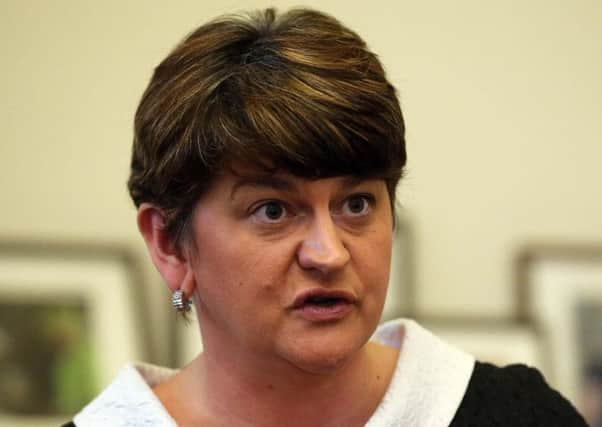Arlene Foster '˜faultless' in stopping Executive discussion of paper on inquest backlog


Attorney General John Larkin QC also argued that the Democratic Unionist Party leader had been focused on balancing a limited £150 million budget for dealing with all outstanding legacy issues.
The defence of his client’s actions came in a legal challenge mounted by the widow of an innocent civilian shot dead along with eight IRA men.
Advertisement
Hide AdAdvertisement
Hide AdBrigid Hughes is seeking to judicially review the administrations in London and Belfast for failing to release the funds necessary to hold a series of inquests into Northern Ireland’s troubled history.
Her husband, Anthony, died after being unwittingly caught up in the SAS ambush of an IRA unit at Loughgall, Co Armagh in May 1987.
Proceedings have been issued against the Secretary of State, the Stormont Executive and Mrs Foster personally due to her alleged responsibility for the logjam.
With more than 50 legacy inquests still outstanding, Northern Ireland’s Lord Chief Justice, Sir Declan Morgan, has advanced a plan for having all cases dealt with within five years.
Advertisement
Hide AdAdvertisement
Hide AdBut the government has said the millions of pounds required will not be released until political consensus is reaching on dealing with the past.
Part of the litigation involves claims of political discrimination being made against Mrs Foster.
A press report where she referred to a perceived skewing towards inquests into state killings pointed to a discriminatory approach, according to Mrs Hughes’ lawyers.
It was alleged that in 2016 she unlawfully blocked a Department of Justice paper on inquest funding before it could be discussed by the Executive.
Advertisement
Hide AdAdvertisement
Hide AdHowever, the court heard a Northern Ireland Office (NIO) official claimed there were weaknesses in its costings and business case.
Stressing the fixed £150 sum for legacy issues, Mr Larkin said: “It’s absolutely proper to try to ensure the pot is balanced.
“We also know from the NIO emails that yes, the paper is undercooked, and we know that the proposal never comes back.”
He contended that judicial scrutiny of Mrs Foster must focus on March 2016 - when the issue did not get onto the agenda at one Executive meeting before Assembly elections.
Advertisement
Hide AdAdvertisement
Hide Ad“During that time the former First Minister is faultless,” he said.
The Attorney General continued: “She has said she is concerned about the balance of overall legacy structures.
“That is an entirely relevant and proper consideration because there’s a limited amount of money for the entirety of the legacy processes.”
During exchanges with the judge, Sir Paul Girvan, he rejected suggestions that Mrs Foster had decided to “pull down the curtains” on any cabinet debate.
Advertisement
Hide AdAdvertisement
Hide Ad“It wasn’t any irrevocable shutting of the door”,” Mr Larkin told the court.
At one stage it was put to him that Mrs Foster had not been running a dictatorship.
“It’s not the First Minister’s job to be the gatekeeper and say it’s my decision that it doesn’t get on (the agenda) and that’s it,” Sir Paul insisted.
But the Attorney General countered that the joint decision making process under which Stormont had been run both the First Minister and Deputy First Minister could veto issues.
Advertisement
Hide AdAdvertisement
Hide Ad“Matters should come up for discussion when they are ripe for discussion,” he added.
“The political judgment is when they are ripe for discussion is a matter for both the First Minister and Deputy First Minister.
“Within the period of time that is at issue as far as the former First Minister is concerned, she is perfectly entitled to decline at that stage.”
The case continues.